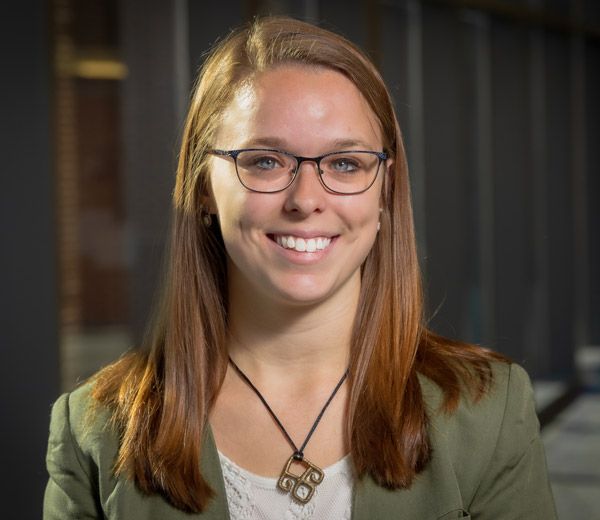 When she arrived at Penn State in the fall of 2016 to begin her dual doctorate, Claire Kelling wasn't wasting time. "I came in with an agenda," she says, flashing a broad grin that belies the determination in her voice.
When she arrived at Penn State in the fall of 2016 to begin her dual doctorate, Claire Kelling wasn't wasting time. "I came in with an agenda," she says, flashing a broad grin that belies the determination in her voice.
Earlier that year something had clicked, and Kelling realized she wanted her graduate research to address social issues, combining her love of statistics with her passion for criminology. Several years before, as an undergrad in statistics and economics at Virginia Tech, she found herself drawn to advocacy and activism amid the rising trend of sexual violence on college campuses across the country. "It was just so shocking to me," she says, "that I felt compelled to do something about it."
Kelling began organizing campus advocacy events to raise awareness of gender-based violence, was elected to serve as president of the university’s feminist activist organization Womanspace+ (now the United Feminist Movement), and began doing volunteer work in her community. In recognition of these efforts, during her senior year Kelling was invited to the nation’s capital to be honored by President Barack Obama and Vice President Joe Biden with a Champion of Change award.
"When we were meeting at the White House," Kelling recalls, "we had a dialogue about 'What can we do?' As data gets better on domestic and sexual violence, our analyses need to improve to adapt to that new data. So when I came to graduate school, I was thinking, 'How can I use these new forms of data and new methods to better understand crime and communities?'"
With Penn State statisticians Murali Haran and Aleksandra Slavkovic and criminologist Corina Graif, Kelling is analyzing public datasets from the U.S. Census Bureau and the Police Data Initiative as well as private police data obtained through several strategic partnerships. By applying statistical models to those data, she is able to characterize social relationships between communities and their effect on crime and other outcomes. "You can start to see where the social hubs are," she explains, "and that's where communities may want to focus their public education efforts. If communities want to have a campaign, for example, on resources related to domestic and sexual violence, they can target the communities or neighborhoods that might be best, not only geographically but also socially."
Kelling hopes to also use that research to improve public policy around sexual and domestic violence through her appointment on the Pennsylvania Commission for Women, which advises the governor on policies and legislation impacting women across the Commonwealth. Her drive for social justice, though, goes further.
"I've always had a passion for understanding crime and violence," she says, "but I’m really interested in policy outcomes and translating research into impacts, and I want to make sure that the work that I'm doing is relevant to communities."
Toward that end, Kelling is also conducting research at Penn State's Center for Social Data Analytics, where she works with political scientists on decreasing barriers to refugee integration. “It’s a great experience," she says, "and a great place to be, where people are interested in policy.”
Looking ahead to her postdoctoral career, she says, "I'd like to be in some sort of policy-relevant field, and I want to continue working with communities. I think people are becoming much more interested in methodology and quantitative methods as they're seeing the use of statistics and modeling to solve societal problems. It would be great to see even more people using and interpreting data to make their communities better."
Building a better society through data—now that's a model even a non-statistician can stand behind.
Claire Kelling is a graduate student in statistics and social data analytics, in the Eberly College of Science and the College of Liberal Arts.